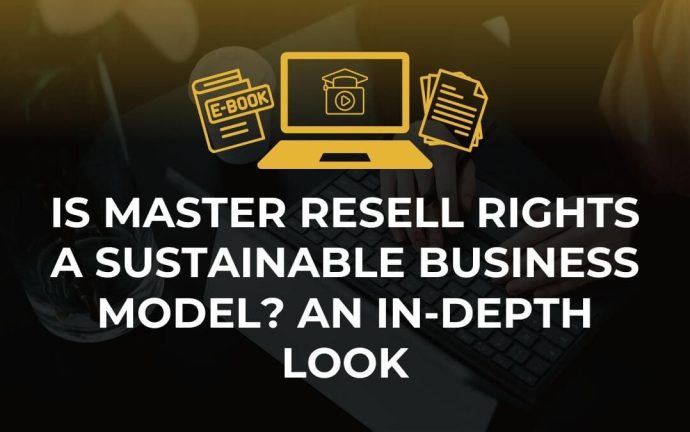
Is Master Resell Rights a Sustainable Business Model? An In-Depth Look
Are you exploring the world of Master Resell Rights (MRR) as a potential income stream? You’re not alone. The promise of high profits and rapid business expansion draws many digital entrepreneurs to MRR programs.
But is it a sustainable business model for the long haul, or just a quick cash grab?
Whether you’re into the Ultimate Branding Course, The Road Map to Riches, or Digital Wealth Academy–some of the most popular MRR programs today—I’ve tailored this guide to help you understand if MRR can truly be the cornerstone of your digital business.
Want to make MRR work for you, not against you? Access my FREE training, where I show you how to build your business on a solid foundation. You’ll learn value-driven strategies that go beyond conventional MRR tactics.
If you find digital marketing concepts overwhelming or confusing, this training will provide the clarity you need to move forward confidently.
Master Resell Rights Video Overview
Want a video tutorial of what Master Resell Rights are and whether they’re a good fit for your business?
Check out my guide to MRR where I cover the ins and outs of this business model and give you my honest opinion about whether MRR is right for you.
What are Master Resell Rights?
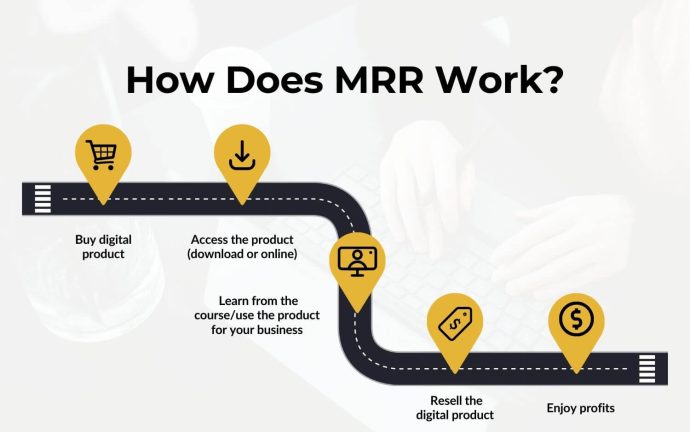
Master Resell Rights (MRR) refer to the rights acquired when purchasing a digital product or course, allowing the buyer to resell it to others.
The concept is similar to wholesale buying in the physical product world, where the buyer has the option to buy a product and sell it as their own.
How Do Master Resell Rights Programs Work?
When you buy a digital product with MRR, you can sell it as is, add to its content, and set yourself as the author. *Note: be sure to check the terms and conditions of the program you purchase and abide by those instead of advice you read here or elsewhere.
For example, if you’ve purchased an MRR program on investing, you can create your own YouTube videos to promote the program. You might cover the latest strategies for building a portfolio or choosing the best investment vehicle.
The beauty of MRR is that when you purchase the program from the creator, you receive the rights to sell it yourself.
Benefits of Master Resell Rights
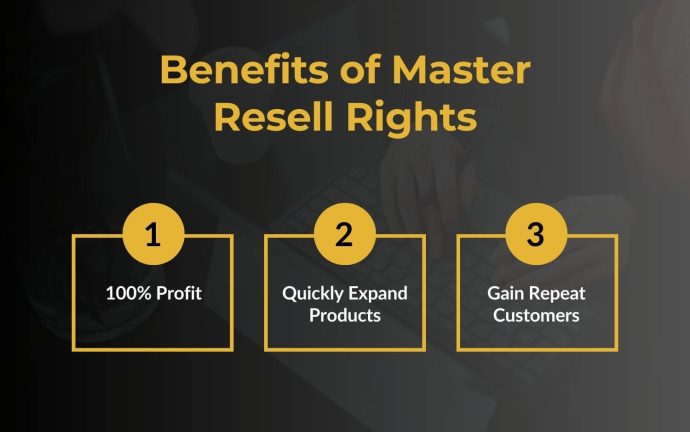
MRR programs are becoming increasingly popular – but what exactly makes this model so attractive? Let’s take a look at the benefits of master resell rights programs.
100% Profit Margin
MRR offers stand out because they allows you to keep every cent of profit from your sales. Once you acquire the rights to a product, you can sell it repeatedly and pocket what you earn.
This complete control over profits can significantly boost your financial returns, especially if you can effectively position and market the products. Simply buy the product once and sell it as many times as you want, continually reaping the benefits without additional costs.
There’s no need to worry about ongoing licensing fees or royalties, which are typical in partnerships or traditional reselling arrangements.
Since you don’t have to share profits with creators or distributors, you can invest more in enhancing your marketing strategies or expanding your product offerings.
Expand Your Product Line Quickly
With MRR programs, you can rapidly acquire rights to various products and launch them under your brand. This speed of expansion lets you tap into diverse market needs without the typical delays of product development.
Why is having different products a good idea? By diversifying your risk across multiple programs, you can maintain a healthy revenue stream without worrying about losing everything if one of your MRR offers fails.
Plus, you can have cross-selling opportunities when you have different kinds of products. For example, if someone buys an eBook from you, you could suggest a related course or software that they’d benefit from.
This helps you sell more and heightens customer satisfaction because they can get everything they need from you in one go.
Gain Repeat Customers
Selling products with Master Resell Rights (MRR) gives you the opportunity to create repeat customers by offering exclusive discounts or special promotions.
Imagine you have purchased MRR for a digital marketing course and have successfully resold it to several customers. To encourage repeat business, you decide to offer a special promotion exclusively to those customers who have previously bought the course from you.
You could provide them with an advanced module or a complementary product related to the initial course they purchased.
By building a solid product base and staying in touch with your audience, you can earn even more income from your affiliate marketing efforts.
Challenges of the Master Resell Rights Model
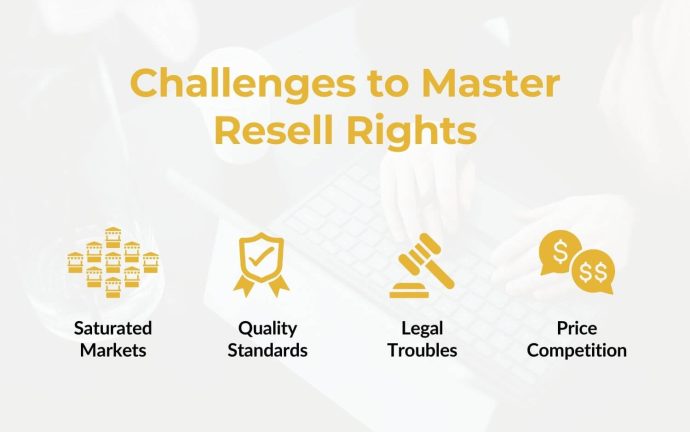
While MRR programs can be a great way to kickstart your income by reselling digital products, they come with their own challenges.
We’ll examine common issues such as market saturation, maintaining product quality, navigating legal complexities, and making your mark in a competitive space.
Saturated Markets
One of the biggest challenges with Master Resell Rights (MRR) products is the sheer volume of competition.
Imagine everyone trying to sell the same thing; it doesn’t take long before you’re lost in a sea of competitors. This is a significant hurdle, as it makes it tougher for anyone to stand out, which can affect sales and overall success.
This saturation dilutes your potential sales and can make it tough to carve out your niche. You might have to slash prices or pump up your marketing game just to get noticed.
It’s not just about selling anymore; it’s about how creatively you can sell and differentiate yourself from competitors.
Maintaining Quality Standards
Another issue is the quality of MRR products. Let’s face it: the quality varies, and some may not meet your standards.
Since you’re not the creator of these products, you must be selective about what you choose to sell. I’ve learned the hard way that not all MRR products are created equal—some just don’t meet the high standards my audience expects.
This difference in quality can lead to customer dissatisfaction and, if not managed carefully, can seriously tarnish your brand’s reputation.
I’ve made it a point to thoroughly vet each product I offer, ensuring it aligns with the value I want to deliver. For me, it’s not just about making a sale; it’s about creating a lasting impression of quality and reliability.
Risk of Legal Troubles
Being aware of the legal risks is crucial when dealing with master resell rights (MRR). For example, while you possess resale rights to MRR products, you don’t hold the copyrights.
This implies that altering the product name or the original content is prohibited, and you must resell it for at least the minimum price you purchased it for.
If you don’t adhere to these terms, you could face copyright infringement issues. So, my advice is to review MRR agreements and licenses carefully to avoid legal troubles.
Competing on Price Alone
In a market flooded with similar MRR products, the easiest lever to pull is often the price. But this approach often initiates a dangerous race to the bottom, hurting your profits and the value of your offerings.
I’ve been in the affiliate marketing world for many years, and I’ve realized that finding ways to differentiate myself is crucial for the success of my business. This applies to MRR products and anything else you’re selling.
Instead of solely focusing on price, I’ve explored avenues to add value and create unique product bundles that set me apart from the competition. This strategy enhances the appeal of my offerings and helps me maintain healthier profit margins in the long run.
Are you finding it challenging to drive sales for digital products like Ultimate Branding Course, The Roadmap to Riches, or Digital Wealth Academy?
Join my FREE exclusive training session where I’ll break down the secrets to effective digital product marketing and how to leverage Master Resell Rights for maximum profit.
Whether you’re a newbie or an experienced marketer needing a strategy refresh, this training will give you the tools and insights to excel in digital product sales.
Examples of MRR Programs
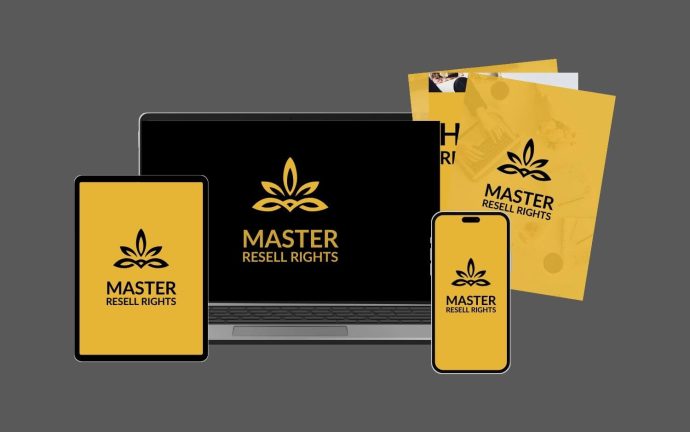
There are three popular MRR courses that are exploding online right now. While I’ve created detailed reviews on each course, you can get a good feel for them in the synopses below.
Roadmap 3.0 MRR Business Course
The Roadmap 3.0 MRR Business Course is a comprehensive digital marketing program designed to guide you through the process of starting and growing your own online business from scratch.
This course is particularly tailored to beginners with no prior experience in digital marketing or the Master Resell Rights business model.
Below are some pros and cons of the Roadmap 3.0 MRR Business Course. I explain all these in more detail in my full Roadmap 3.0 review but here’s a quick summary.
Roadmap 3.0 MRR Pros
Launchpad for new entrepreneurs, providing essential startup basics.
Over 330 video lessons on digital marketing topics like SEO, branding, and automation.
Allows reselling of the course with 100% profit retention.
Free, ongoing updates to keep content relevant.
Access to a community, mentorship, and strategy calls for guidance.
Roadmap 3.0 MRR Cons
May not align with specific business goals.
Initial capital or time investment is needed despite affordability.
Risk of market saturation in MRR, challenging distinctiveness and sales.
Some buyers may lack the skills to market and sell MRR products effectively.
Important to understand the legal aspects of MRR, including copyright laws.
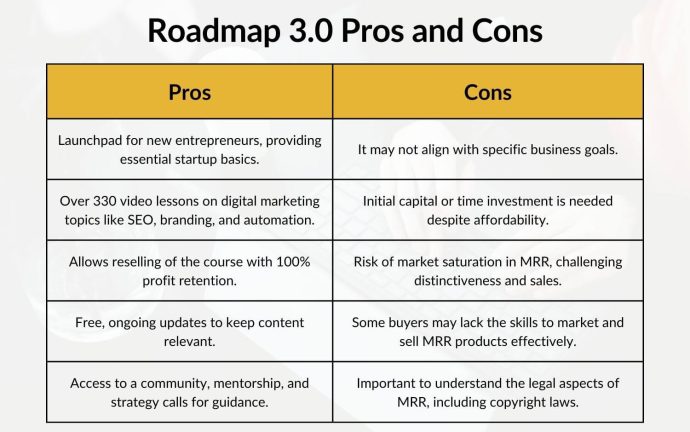
Here’s a look at the course content of Roadmap 3.0:
Stage 1: Your Foundation
Modules on digital entrepreneurship
Understanding your niche and building a solid base
Stage 2: Your Automation
Modules on using tools like Stan Store and Systeme.io
Lessons on email marketing automation
Stage 3: Driving Your Traffic
Modules on sales strategies
Content creation techniques
Guidance on marketing platforms
Stage 4: Build Your Offer
Lessons on taking an idea to a market-ready product
Guidance on building personal products
Stage 5: Scale with Customer Service
Modules on the role of customer service
Tools for business efficiency
Staying motivated in your business
Intrigued and want to learn more? Register for my FREE exclusive training session where I do a deep dive into MRR programs.
Digital Wealth Academy Program
The Digital Wealth Academy (DWA) Program is a structured course that teaches you the fundamentals of digital marketing, including mindset building, creating lead magnets, branding, Instagram strategies, affiliate marketing, and creating digital products.
This program equips you with the knowledge and tools needed to build a successful online business, offering insights into various aspects of digital marketing to help individuals establish and grow their online presence effectively.
I’ve summarized some of the pros and cons of DWA below. Read my detailed DWA review to learn more about the program.
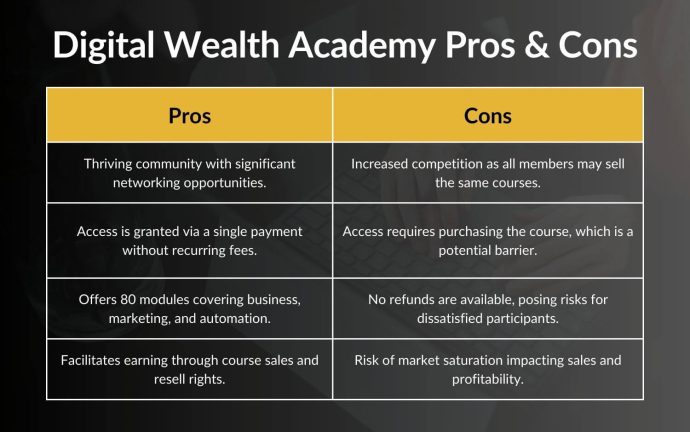
Here are some of the topics covered in DWA:
Business Foundations: Learn the fundamentals of being a successful entrepreneur and set up systems and products for maximum success and sustainable growth.
Creating Sales Funnels: Setting up effective sales funnels to resell The Roadmap course or launch new businesses, optimizing existing ones.
Business Automation: Understanding how to automate business processes with follow-up campaigns and automation to run the business on autopilot and maximize sales.
Branding, SEO, and Social Media Marketing: Strategies for effectively branding oneself, performing well in search engine optimization (SEO), and marketing on various social media channels.
Creating Highly Converting Sales Funnels: Learning how to create sales funnels that convert effectively to drive sales and revenue.
Email Campaigns: Understanding the essentials of email marketing campaigns to engage with customers and drive conversions.
Other Aspects of Digital Marketing: The program covers various aspects of digital marketing to help individuals create a profitable passive income business, including strategies for success in the online business world.
Ultimate Branding Course
The Ultimate Branding Course (UBC) is designed to be the ultimate resource for anyone looking to master the art of branding in the digital world. It offers in-depth education and the opportunity to earn through reselling the course.
UBC includes over 150 detailed video tutorials that cover a wide range of topics essential for successful online branding. These include content creation for platforms like TikTok and Instagram, organic growth strategies, and comprehensive sales techniques.
Here’s a quick comparison of the pros and cons of UBC. I also did a full UBC review that covers the course in depth.
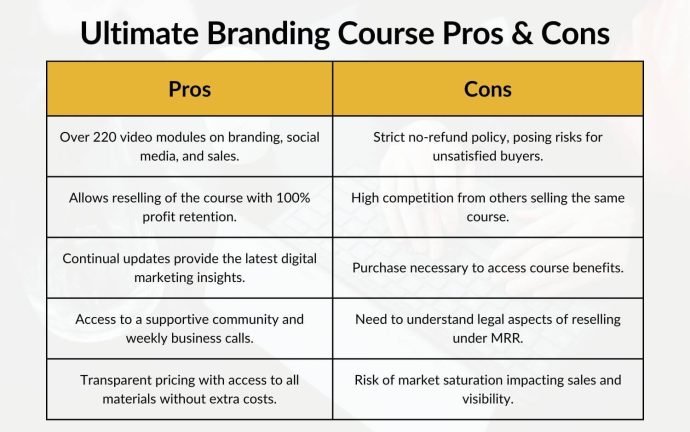
UBC’s course content is massive! It has more than 200 video trainings on a wide range of topics, from funnel building to high-quality branding, and effective launching strategies.
It also provides in-depth training on leveraging Instagram, TikTok, and other social media platforms for marketing, as well as guidance on content creation, email marketing, and attraction marketing.
The course further goes into:
Efficiency and organization techniques
Instagram Reels optimization
Video editing skills
Master Resell Rights (MRR) mastery
Faceless marketing strategies
Mindset development and online selling
Whether you’ll actually go through all that content, depends on your dedication and how deep you want to dive into enhancing your skills. But one thing’s for sure: the resources are there, ready to guide you every step of the way if you choose to leverage them fully.
Ready to jump into MRR marketing? Join my free training to learn how you can build your business with Master Resell Rights programs.
What is the Difference Between Master Resell Rights and Affiliate Marketing?
Master Resell Rights (MRR) and affiliate marketing are both popular strategies in the digital marketing world, but they operate under quite different models.
When you buy a product with MRR, you become a reseller. As a reseller, you handle all the marketing, sales processing, and client relations/customer support.
Affiliate marketing, on the other hand, is more hands-off regarding product management.
As an affiliate marketer, you focus primarily on promoting the product and driving leads through your unique affiliate link, without needing to manage the actual sales process or customer service.
Pros and Cons: MRR vs. Affiliate Marketing
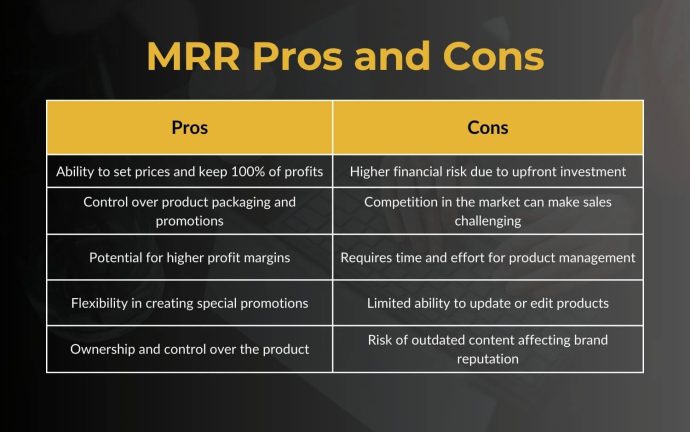
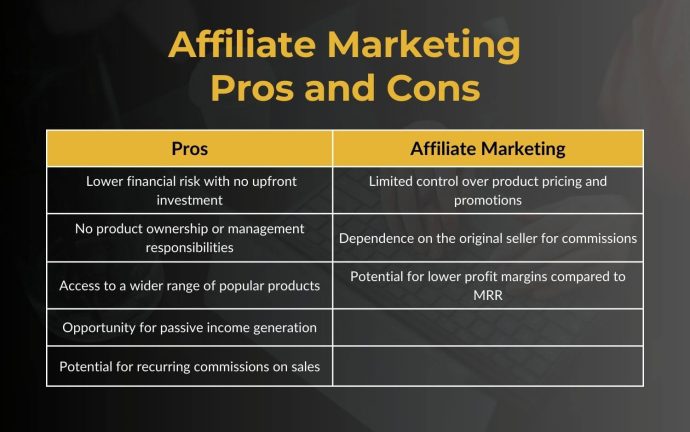
If you’re deciding whether to choose MRR or affiliate marketing, consider your goals, resources, and how much control you want to have over the products you sell.
MRR might be the way to go if you’re looking for higher profit margins and more autonomy in how you market and sell products.
On the other hand, if you prefer a lower-risk entry into the market with less responsibility for product management and customer service, affiliate marketing could be the better choice for you.
Affiliate marketing offers the potential to earn recurring commissions on subscription-based products, providing a source of passive income over time as customers continue to make payments, which may not be as prevalent in MRR.
MRR Vs. MLM
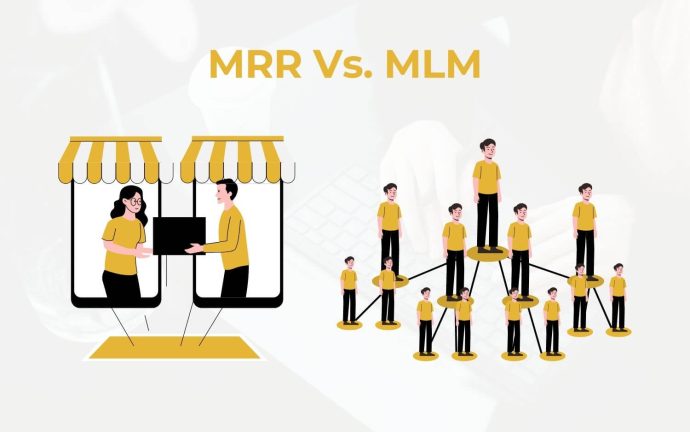
What about the differences between Master Resell Rights (MRR) and Multi-Level Marketing (MLM)? There seems to be a common misconception that these two business models are the same, which couldn’t be further from the truth.
MRR is not MLM. Let me explain.
Normally with MRR programs, you buy the product for a set price and resell it for the same price.
For example, if a program is $497, you can only resell it at $497. There are no hidden fees, no revenue sharing with others, and notably, no upsells.
You keep the entire $497 from each sale, with no portions going to any third parties, not even to the people from whom you originally purchased the course. As the reseller, you retain full profit from the sale, and there are no additional sales beyond the initial transaction.
On the other hand, MLM involves not just selling products but also recruiting others to sell these products under your referral.
In MLM, profits are not just generated through direct sales but also through the sales made by those you recruit into the business (your downline). This model often requires ongoing involvement in both sales and recruitment, and the profit from any sale might be split across several levels of the organization.
Unlike MRR, MLM can involve complex compensation structures and the potential for earnings depends not only on your sales but also on the performance of your downline.
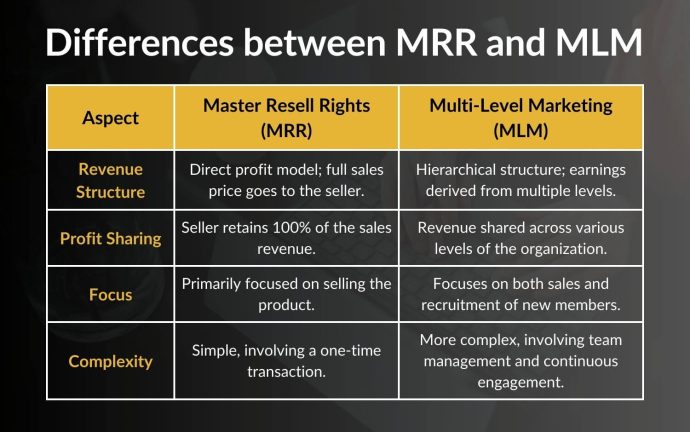
Are Master Resell Rights Legit?
Yes. Master Resell Rights (MRR) are definitely a legit digital product option.
Not only do these programs offer you content that can boost your know-how in marketing, content creation, social media management, and more, but the chance to resell these materials is a huge plus.
For example, I know someone who applied what she learned from an MRR course to help her sister’s handmade crafts store flourish on social media, and they saw a significant sales boost in just a few months.
With that said, I’ve noticed a trend where lots of people are jumping into MRR mainly to resell the same courses—not to gain business and digital marketing skills.
It’s becoming a bit of a crowded space where everyone’s pushing the same products, often without a genuine strategy for building a sustainable, robust business.
What I Think About The MRR Business Model
I’ve spent a good amount of time diving into the Master Resell Rights (MRR) business model, and here’s my honest take on it.
While MRR can certainly seem like a quick way to jump into the business world with products ready to sell, it’s not without its challenges. It’s crucial to understand that relying solely on MRR might not be the best long-term strategy. Let me explain why:
Over-reliance on Products
It’s easy to fall into the trap of relying too much on MRR products. Many marketers focus too heavily on the products themselves rather than on delivering value and solving problems for their audience.
This product-centric approach can lead to reduced viewer engagement and a lack of long-term business sustainability.
Short-term Gains Over Long-term Value
Focusing solely on the immediate profits from MRR can be tempting, but it’s a risky game. I believe in building a lasting business and prioritizing long-term value over quick wins.
Invest in creating genuine relationships and delivering real solutions, which will pay off more than any short-term gains.
Ineffective Marketing Practices
Relying on outdated or ineffective marketing practices just because they are packaged with MRR products is a common pitfall. It’s crucial to stay up-to-date and adapt to the latest marketing strategies.
Remember to customize your approach to meet your audience’s current needs, ensuring your marketing efforts are as effective as possible and truly resonate with your customers.
Beyond MRR: How to REALLY Build a Sustainable Business
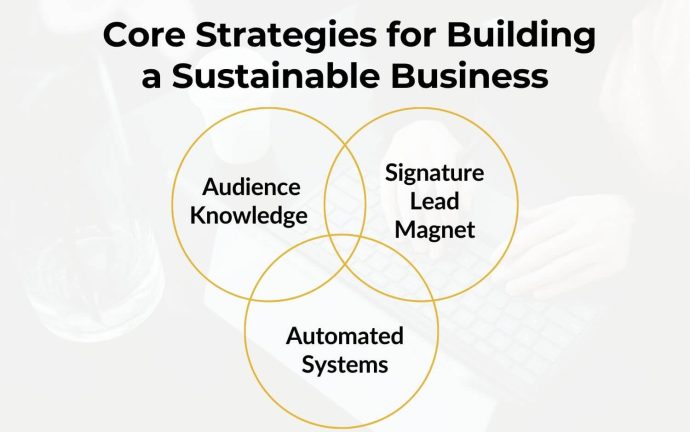
MRR products are great for getting your feet wet and testing the waters of entrepreneurship.
However, the real growth comes from using these products to complement your main offerings and build a business model that addresses the broader needs of your market.
For instance, I often bundle MRR products with unique services or content that aligns with my audience’s needs, adding value and diversifying my income streams. This approach helps solidify my brand’s presence in the market and ensures I’m not just another seller in the crowd.
In my approach to digital marketing and building an online business, I focus on three core strategies that have shaped my journey and success:
Knowing Your Audience
I cannot stress enough the importance of truly understanding who you are serving. For me, it’s about digging deep into the specifics: What are their needs? What problems do they face? How can I address these?
Instead of merely pushing products, I lead with content that delivers real value right where my audience needs it most.
This strategy is about creating trust and credibility by offering solutions that genuinely make a difference in their lives. I spend a lot of time listening to my audience and customizing my offerings to fit their unique challenges and desires.
Creating a Signature Lead Magnet
Developing a signature lead magnet has been a game-changer for my business. This involves providing something of significant value for free — something that solves a pressing issue for my audience — in exchange for their contact information.
This not only helps in building a list of potential customers but also starts our relationship on the right note, with me providing value upfront. It’s about nurturing this relationship and establishing my credibility as someone who not only understands their problems but also has the expertise to help solve them.
Developing an Automated System
Lastly, I’ve set up an automated system that handles multiple products and supports various income streams, including high-ticket offers and recurring revenues.
At the heart of this system is a robust email marketing strategy that nurtures leads through a well-thought-out sales funnel. This isn’t just about automation for the sake of efficiency; it’s about creating personalized, meaningful interactions that build loyalty and increase conversions.
My automated system ensures that we continue to engage customers in a way that feels personal and relevant, turning one-time buyers into lifelong customers.
Throughout all of this, I maintain a focus on leading with value. I share openly about my own experiences — the good and the not-so-good — because I believe in learning from every step of the journey.
Struggling? Get the Clarity You Deserve in My FREE Training
Are you struggling to effectively market and sell digital products like Ultimate Branding Course, The Roadmap to Riches, or Digital Wealth Academy?
Don’t miss my FREE exclusive training where I’ll demystify email marketing and show you how to build a robust email list – the cornerstone of any sustainable online business.
In this power-packed session, you’ll discover:
Key strategies for starting and growing an email list.
How to align your email marketing efforts with your overall business goals.
Practical advice on enhancing subscriber engagement and retention.
Whether you’re just starting out or looking to refine your approach, this training will provide the clarity and actionable insights you need to navigate the complexities of digital marketing with confidence.
Don’t miss this opportunity to transform your marketing approach and unlock the true potential of your online business!
About the Author

Jonathan Montoya is the founder of the 72 Hour Freedom Challenge, which has empowered over 55,000 people to leave their 9-5 jobs and achieve their dream lifestyles.
After starting his own online business in May 2019, Jonathan transitioned from Electrical Engineer to full-time entrepreneur within nine months. His mission is to help others reach their financial and lifestyle goals quickly and easily.
Jonathan’s unique approach to affiliate marketing has enabled him to reach over 600,000 people who are working to quit their 9-5.
Outside of his professional achievements, Jonathan cherishes time with his wife and children, who have been a constant source of support and inspiration throughout his journey. Read more about Jonathan here.
